
THE VOICE OF INTERNATIONAL LITHUANIA
|
VilNews has its own Google archive! Type a word in the above search box to find any article.
You can also follow us on Facebook. We have two different pages. Click to open and join.
|
News
- Posted by - (0) Comment

She did it! Lithuanian climber Edita Nichols conquers Mount Everest
One and a half months of acclimatization, training, uneventful waiting at the Base Camp, and freezing weather – all for a fleering moment on the world's highest peak. In the early morning of Wednesday, May 22, Edita Uksaitė Nichols finally did it – she reached the top of Mount Everest.
Having left the last camp on Wednesday night, Edita's team went on the summit push on the more challenging northern side.
"I did it, I did it, I did it!" Edita called and told her partner right after safely descending to Camp 3. "It was so technical and so scary, it was the hardest thing I have ever done in my life."
"You know what the best thing about it is?" she asked and, after a moment's pause, confided: "I will never have to do that again!"
According to Edita's blog, the group reached the summit at 8 AM. Due to challenging weather, only four people of the group of ten climbers made it to the top.
- Bookmark :
- Digg
- del.icio.us
- Stumbleupon
- Redit it
- Posted by - (0) Comment

U.S.- Lithuanian
Leland H. Ruth receives U.S. cooperative community’s
highest honor
American-Lithuanian Leland H. “Lee” Ruth received the U.S. cooperative community’s highest honor on May 8, 2013 when he was inducted into the Cooperative Hall of Fame. The ceremony was held at the National Press Club in Washington D.C.
The Cooperative Hall of Fame award was established by the National Cooperative Business Association to honor individuals who have performed outstanding service in advancement of cooperatives as a business model.
His professional career focused on service to agricultural cooperatives, including 33 years with the Agricultural Council of California. His leadership helped establish the Center for Cooperatives at the University of California and the California Center for Cooperative Development. As co-chair of the National Rural Cooperative Development Task Force, he was instrumental in creating the Rural Cooperative Development Grant Program a USDA source of funding that now supports the work of 29 Cooperative Development Centers across the country.
Ruth is of Lithuanian heritage, with the family surname originally being Rutkauskas. In 1999 he served as a co-founder of the Auksuciai Foundation. This non-profit organizations' mission is to help small scale Lithuanian farmers succeed. It funds the Auksuciai Farm & Forestry Center near Kursenai, Lithuania. The Center conducts a year long program of research on new crops, improvement of existing crops and improved farming practices. This year marks the 14th year of service with a Farmers’ Field Day set at the farm on May 24, 2013.
- Bookmark :
- Digg
- del.icio.us
- Stumbleupon
- Redit it
- Posted by - (0) Comment

April brought a visible increase in Lithuania's real estate market activity as property transactions jumped 16% year on year, reports news2biz LITHUANIA.
Apartment trade increased by a solid 35% to a post-crisis monthly record of 2,343 units, according to preliminary figures from the real estate registry operator Registru centras. The Vilnius market went even higher with a 47% jump in April to close to 800 units.
Trade in non-residential building and premises was also up y/y across the country but still below record months in 2012. Trade in land plots intensified by 15% y/y.
Because of the absence of fundamental factors that could signal a general improvement in the financial situation of households (real wages still not growing, unemployment still in low teens), market analysts believe that the jump in activity is related to real estate being seen as a good investment alternative to low interest rate bank deposits.
Such an interest is also backed by the current ultra-low interest rates on mortgage loans, and banks are reporting a rising mortgage loan demand. For instance, Danske Bank, a relatively small player on the home loan market, said the number of mortgage loans it concluded during Q1 2013 almost trebled y/y to around LTL 33m.
"I won't go into details about why we found no common language with the first buyer. Now we have signed a head of terms with another potential buyer who is already known for its investments in Vilnius. In a few months we may have a deal," says Richard Schrijer, head of Evita's owner Respektas, to news2biz.
Evita has 4,500 sq.m of commercial space on Savanoriu Avenue, a busy commercial street leading to the Kaunas exit road. "It is fully leased out to two tenants – Norwegian Storebrand and local Teo telecom. The residential units are not covered by the potential sale. Of these we have 10 still vacant and around 50 sold," says Schrijer.
Although he would not name the new potential buyer, Schrijer says it is quite optimistic about investment leads that it sees in Vilnius. "These investors are not in the least as gloomy as some of the local players. They say, go to Southern Europe, see and compare."
Evita's original developer was Dutch-owned MEI Baltija (see no 300 page 7). "The present owners of Evita used to be minority shareholders in MEI Baltija. For them it was their first project in Lithuania and they are likely not to call it a success story," Schrijer notes.
The Norwegian company that was interested in Evita is Auris LT, a commercial real estate company owned by Odd Rune Austgulen, a Norwegian investor. Evita could have been Auris LT's second project after a new office centre in one of Vilnius' residential areas that was acquired more than a year ago. Austgulen has also co-invested in two logistics properties in Vilnius and Riga.
- Bookmark :
- Digg
- del.icio.us
- Stumbleupon
- Redit it
- Posted by - (0) Comment
CSC Baltic, the Lithuanian arm of US Computer Sciences Corp (CSC) global IT services player, plans to boost its Vilnius-based office with hundreds of new staff, reported news2biz LITHUANIA.
Five years in business, the Vilnius unit specialises in providing 24/7 IT infrastructure support for mostly finance, logistics and travel sector customers located in the Nordics but also other European countries and even much further, in the US and Asia. It now employs 290 staff, of which around 50 have been added in recent months.
During the next few years these two figures will dwarf as CSC Baltic plans to grow to 1,000 jobs. The growth will be part of CSC's new USD 1bn, 12-18 month cost cutting campaign announced by the company's new CEO in mid-2012. The New York-listed group was hit with a USD 4.2bn loss last year. Cost cutting, among other things, will mean more jobs for the relatively cheap Vilnius office.
At a press conference in Vilnius to mark the 5-year anniversary and announce the expansion plan, John Walsh, CSC's Denmark-based VP and head for Northern Europe, commended Lithuania's ability to supply multi-language staff who provide IT support on using various business management and security systems.
- Bookmark :
- Digg
- del.icio.us
- Stumbleupon
- Redit it
- Posted by - (0) Comment

Belarus seeks bigger say in Klaipeda Port, writes news2biz LITHUANIA.
Lithuania's southern neighbour Belarus plans not only to increase the already significant volume of cargo exported through Klaipeda but have a bigger say in the port's business, writes news2biz LITHUANIA.
At the recent Lithuania-Belarus business forum in Lithuania's only port city, the Belarus side announced that the state-owned Belaruskalij fertilizer producer is acquiring for USD 30m a 30% stake in Biriu kroviniu terminalas, a fertilizer reloading terminal, controlled by a Klaipeda transport investor.
The Lithuanian company has not confirmed the deal but commented that talks are indeed underway.
Belaruskalij is a global-scale player in potash mineral fertilizers and the biggest producer in the former Soviet Union. Klaipeda has long competed with Latvia's Ventspils for the status of the fertilizer giant's preferred export port. Belarus' government plans selling a 10-15% stake in Belaruskalij to an investor. Reportedly, potential suitors from China, India, Europe and the Arab world are interested in the deal.
The Belarus side is also interested in acquiring Bega, another bulk and liquid fertilizer reloading specialist in Klaipeda with a 6m tonne annual capacity that is planned to rise to 10m tonnes by 2020. At the end of last year the company constructed an LTL 80m agriculture product terminal.
- Bookmark :
- Digg
- del.icio.us
- Stumbleupon
- Redit it
- Posted by - (0) Comment

Over the past three years the share of EU citizens who want to be self-employed has fallen from 45% to 37%
Brussels, Belgium — Over the past three years the share of European Union (EU) citizens who want to be self-employed has fallen from 45% to 37%, reports European Commission (EC). This year EC highlighted the need for more entrepreneurs in order to return the EU to economic growth and higher levels of employment.
However, historical, cultural and economic background of diverse European countries has significant effects on attitudes towards entrepreneurs in European countries. Lack of in-depth knowledge might determine future revival of entrepreneurship in Europe, reveals the study by Lithuanian Free Market Institute (LFMI) today presented in Brussels.
“It is a positive trend in Europe to turn to entrepreneurs and acknowledge their role in creating economic growth. Yet, without knowing the mistakes of the past, there is no future. This is especially important then considering New Member States, such as Lithuania or Bulgaria, which still carry a burden of post-communist past. Therefore, only full understanding of entrepreneurial situation per country can guarantee that necessary measures will be taken and they actually will give wanted results”, says Zilvinas Silenas, President of LFMI.
In line with the acknowledged need to revive entrepreneurial spirit of Europe, LFMI conducted an international in-depth study in two New EU Member States, Lithuania and Bulgaria, and for comparative reasons in two non-EU countries – Georgia and Kyrgyzstan. The aim of the current study was to determine attitudes towards entrepreneurs in countries sharing the same post-communist past and underlying historical, cultural and economic reasons of such attitudes.
How to get rid of the “exploiter” image of the entrepreneurs?
Read more...
- Bookmark :
- Digg
- del.icio.us
- Stumbleupon
- Redit it
- Posted by - (0) Comment
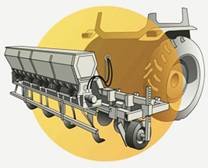
American company opens agricultural plant in Vilnius district
Kinze Manufacturing Inc., the second largest planting and seeding equipment manufacturer in the United States, will open a production facility in Vilnius District along the highway to Druskininkai. The facility will manufacture the company’s agricultural machinery product line, planters/seeders, to support its growing market in neighbouring countries including Russia, Ukraine, Czech Republic, Bulgaria and Hungary. It will open in autumn 2013 and start with 10 employees. In a few years the manufacturer will eventually employ 250 welders, mechanics, CNC operators and other specialists in its Lithuanian operations.
“This is our first plant abroad geared to increasing sales in Russia, Ukraine and the whole of the European Union,” commented Susanne Kinzenbaw Veatch, Vice President and Chief Marketing Officer of Kinze Manufacturing, Inc. “We were looking to expand in Eastern Europe and were considering Slovakia, Poland or Lithuania. We chose Lithuania because the local workforce is undoubtedly productive and cost-effective. Also we were very impressed by the country’s long-standing manufacturing traditions and the degree to which public institutions were attentive to our business needs.”
Read more...
- Bookmark :
- Digg
- del.icio.us
- Stumbleupon
- Redit it
- Posted by - (0) Comment
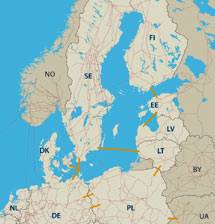
Increased import of electricity from the Nordic countries
The newsletter Energy Update, published by the Lithuanian transmission system operator Litgrid, summarizes the latest developments in the Lithuanian electricity sector.
In this issue:
- Good results in 2012 for Litgrid;
- Contractors selected for the reconstruction of the Alytus switchyard and the construction of the LitPol Link overhead line;
- Government allows laying a cable for the NordBalt electricity connection in the coastal zone;
- Liudas Liutkevičius: Electricity market – the active gain and the passive lose;
- In a few years, a new electricity transmission line will connect Kretinga and Benaičiai;
- Bigger import of electricity from the Nordic countries;
Please find attached the newsletter Energy Update.
- Bookmark :
- Digg
- del.icio.us
- Stumbleupon
- Redit it
- Posted by - (0) Comment
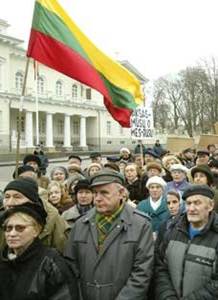
Lithuanian growth slows down
Spreading economic weaknesses in the euro zone and emerging downside risks coming from Russia – the key export markets – point to gradual slowdown in Lithuania’s economic momentum in 2013, especially in the second half of the year. Delayed capital investments and not responsive private consumption will not compensate the deceleration in export markets. Prolonged winter season did not allow for revival in construction, which still stays in red. However, we expect construction sector to bounce in 2013, finally adding to economic growth.
Assessment: We expect Lithuania’s economic momentum to slow down further to annualized 2 percent in 2013 on the back of adverse external environment and higher base. Notwithstanding the slowdown next year Lithuania’s together with Estonia are forecast to restore their pre-crisis level in value added in real terms.
Read more...
- Bookmark :
- Digg
- del.icio.us
- Stumbleupon
- Redit it
- Posted by - (0) Comment

NEWS RELEASE
Member States of EU lose billions in unpaid taxes from
counterfeit and smuggled goods
April 26, 2013
Vilnius, Lithuania — The European Union and Member States lose billions in unpaid taxes every year from counterfeit and smuggled goods. Senior-level tax policy, tax administration and customs officials as well as academics, experts from Eastern European and other countries in a two-day conference in Vilnius address a range of issues involving the shadow economy. The International Conference on the Shadow Economy and Taxation is jointly organized by the International Tax and Investment Center (ITIC) and the Lithuanian Free Market Institute (LFMI).
“In every area of the world where strong price differentials exist between jurisdictions – largely driven by taxation – contraband can be encouraged. The European Union and Member States lose approximately €10 billion in unpaid taxes every year from counterfeit and smuggled tobacco products only”, says Daniel Witt, President of ITIC.
The Eastern European countries or the “new” European Union members, such as Bulgaria, Cyprus, the Czech Republic, Latvia, Lithuania and Poland have higher shadow economies than the “old” European Union countries, like Austria, Belgium, Germany, Italy, observes Prof. Friedrich Schneider (Austria), speaker of the conference.
“This conference is a unique opportunity not only to share good practice in tackling shadow economy, but to expand thinking on how to reduce the illicit activities as well, what is very important for Lithuania and the whole region. It is a good platform to develop proposals how cross government and international cooperation, public-private initiatives can strengthen the forces fighting the shadow economy in order to benefit economic development”, says Žilvinas Šilėnas, President of LFMI.
The conference brings together revenue and customs authorities and policy makers from the EU Member States, World Customs Organization, Interpol, Europol, renowned academics, private sector and industry experts. Among speakers Antanas Šipavičius (Lithuanian Customs), Elizabeth Allen (ITIC), Prof. Louise Shelley (George Mason University), Carlo van Heuckelom (Europol), Dr. Nerijus Mačiulis (Swedbank), Simone Di Meo (Interpol), Vytautas Žukauskas (LFMI), Katarzyna Banaszek (World Customs Organization) and other.
“Smuggling is not just a matter of border security. It is tightly related to the burden of excise tax, general economic situation in the country, public attitudes. Therefore, the most effective ways to combat shadow economy are ones which are directed towards reducing incentive to operate in the shadow economy”, claim Vytautas Žukauskas, LFMI senior expert.
Various researches show, when excise tax levels become excessive, consumers willingly purchase cheaper illicit products to save money. Recent study of LFMI on public attitude towards smuggling and consumption of illegal goods (for fuel, alcohol products and cigarettes) in three Baltic States showed that citizens see large price differences between the Baltic and non EU neighboring states as one of the main reasons determining smuggling, as mentioned by 50% of Latvians, 55% of Estonians and 46% of Lithuanians. 84% of Latvians, 83% of Lithuanians and 76% of Estonians say that the most effect measure to combat smuggling is to reduce taxes (excise).
Prof. Louise Shelly observes that developing countries are the main source of most counterfeits. “Many governments are reluctant to crackdown seriously on counterfeit production because of the economic dislocations it would cause. Therefore, inadequate regulatory and law enforcement resources are allocated at the source, and the products get harder to trace after they depart from the point of production. In most parts of the world, counterfeit products, including cigarettes, are sought by many consumers. Complicating the problems of detection is that in the developing world, the counterfeit goods often travel with legitimate commodities, thereby reducing risk and maximizing the utility of existing distribution networks.”, claims Prof. L. Shelley.
Elizabeth Allen, ITIC Program Manager, highlights the need for a comprehensive cross national government approach tackling supply and demand. “Criminals will take advantage of weaknesses in legislation and controls and quickly adapt their methods to overcome any new obstacles put in their way. Remember, they don’t have to comply with legislation, departmental rules or financial constraints”, says E. Allen.
The conference is being jointly organized by the International Tax and Investment Center (ITIC) and the Lithuanian Free Market Institute (LFMI). It aims to focus on the nature, extent and implications of the shadow economy and illicit trade for the region and to expand thinking on how to reduce the illicit activities. ITIC is a nonprofit research and education foundation, has worked on tax policy and administration issues throughout Eurasia since its founding in 1993. LFMI is a private non-profit non-partisan organization established in 1990 to promote the ideas of individual freedom and responsibility, free market, and limited government.
Visit www.iticnet.org
Visit www.freema.org
MEDIA CONTACT:
Vidmante Sirgedaite, Communication Officer
Lithuanian Free Market Institute
3A Šeimyniškių St., LT-09312 Vilnius, Lithuania
Tel. 00370-5-250-0281,
Mobile: 00370-653-70777
E-mail: Vidmante@lrinka.lt
- Bookmark :
- Digg
- del.icio.us
- Stumbleupon
- Redit it
- Posted by - (0) Comment
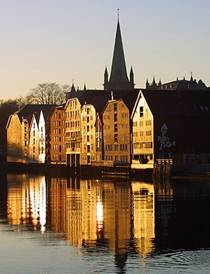
Trondheim is Norway’s technology capital, with exceptionally strong Viking era roots.
Wizz Air opens two new routes from Vilnius –
to Trondheim and Ålesund in Norway
Low-cost airline Wizz Air is celebrating the 2 year anniversary of its base at Vilnius. Wizz Air's Lithuanian base opened on 16th of April of 2011 and has since grown significantly, Reported LETA / ELTA the airline.
Currently, there are 2 Vilnius based aircraft with 22 local pilots and 40 local cabin crewmembers that operate on 14 routes flying 2:08 countries including the United Kingdom, France, Italy, Spain, Germany, Denmark, Norway and Ukraine.
"During our two years of operations in the Lithuanian capital as a local base, Wizz Air has carried over 800,000 passengers and the staffing of the base with Lithuanian professionals was also good news for the local job market. Wizz Air is Continuously opening new Lithuanian low fare routes. Recently we announced two new services Alesund and Trondheim starting in early June as well as the route connecting Vilnius with Kiev that will start operating from early July, and we look forward to further grow in Lithuania, "said Corporate Communications Manager at Wizz Air Daniel de Carvalho.
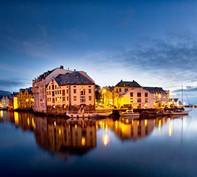
Ålesund is Norway’s
Jugend Style capital.
- Bookmark :
- Digg
- del.icio.us
- Stumbleupon
- Redit it
- Posted by - (0) Comment

Lucintel estimates moderate growth for Lithuanian economy through 2018
The economy of Lithuania is expected to reach $57.3 billion by 2018. Economic growth of the country declined in the wake of economic crisis, but recovered impressively due to factors such as government stimulus packages and export growth. Slow growth rate was mainly caused by service sectors as construction, real estate, and financial intermediaries witnessing low productivity against increasing labor costs.
Lithuania is lagging behind Europe’s leading economies in terms of economy size and per capita income.
The study reveals that Lithuania is extremely dependent on trade with other European countries. Hence, change in the external demand may affect the economic situation.
Secondly, the population in Lithuania has been constantly decreasing over the last decade, as young people are emigrating to other countries for jobs and better livelihoods.
Read more...
- Bookmark :
- Digg
- del.icio.us
- Stumbleupon
- Redit it
- Posted by - (0) Comment

Without immigration policy, Lithuania will no longer be of interest for people who want to live here
Unless Lithuania adopts a sensible immigration policy, it is heading towards a demographic disaster – in 10 or 20 years, it will be a country of old men.
Canadian economist Arthur DeFehr, who has a business in Lithuania, offers the experience of Manitoba province in his native Canada as an example to follow. When it faced depopulation, the prairie province started importing foreigners it needed to revive the economy. The results more than met expectations – unemployment started shrinking and remained below the national average even during the downturn.
DeFehr, who has a degree from Harvard School of Economics and a wealth of international experience, knows what he is talking about. He was a godfather of the initiative aimed at attracting immigration to Manitoba. Over a decade ago, he became a member of the Trilateral Commission, has been in the World Economics Forum for many years, and has been developing a furniture business for almost five decades.
“If you're concerned about depopulation, you must think what to do,” DeFehr tells 15min. “People are moving to the city, so maybe Vilnius could keep its population. But if people continue to emigrate, both Vilnius and Kaunas will start shrinking. Social problems will surface – nothing new happening, universities shrinking... A country that has lost almost one third of its population over twenty years is facing a disaster in another 10 or 20 years. Lithuania will no longer be interesting enough for people to want to live here, it will become a place for pensioners.”
Read more…
- Bookmark :
- Digg
- del.icio.us
- Stumbleupon
- Redit it
- Posted by - (0) Comment

Lithuania leads the EU in industrial growth
In January 2013 compared with January 2012, industrial production decreased by 1.3% in the euro area (EA17) and by 1.7% in the EU27, according to estimates released by Eurostat, the statistical office of the European Union. Based on these estimates, Lithuania is among the countries with the highest growth of industrial production in the EU.
Among those countries for which data are available, industrial production fell in eleven and rose in seven EU member states. The largest decreases were registered in Sweden (-5.9%), Finland (-5.4%), Greece and Spain (-5%), with the highest increases in Bulgaria and Lithuania (8% each) as well as Estonia (5.5%).
In January 2013 compared with January 2012, production of durable consumer goods fell by 5.5% in the euro area and by 4.3% in the EU27. Intermediate goods production dropped by 3.1% and 3.4%, respectively. Capital goods production decreased by 2.6% in both zones. Production of energy increased by 0.9% in the euro area and remained stable in the EU27. Production of non-durable consumer goods rose by 3.1% and 2.2%, respectively.
- Bookmark :
- Digg
- del.icio.us
- Stumbleupon
- Redit it
- Posted by - (0) Comment

Estonians to develop four office buildings in Vilnius for EUR 44m
Estonian E.L.L. Real Estate property development and management group that is majority-owned by Estonian businessman Toomas Annus plans to develop four office centres in Vilnius with a total leasable area of 44,000 sq.m at a cost of EUR 44 million euros, writes Äripäev with reference to news2biz LITHUANIA.
First in line is the smallest project of the four, a 4,300 sq.m, 7-storey, class A building very close to Vilnius' central business district. E.L.L. has already hired Lithuanian Baltic Engineers consultancy to design the technical project and find architects.
The building will be located next to a residential multi-unit house developed by E.L.L. earlier, and overlooking E.L.L.'s biggest project in Lithuania to date, the 65,000 sq.m Panorama shopping and business centre.
Read more...
- Bookmark :
- Digg
- del.icio.us
- Stumbleupon
- Redit it
- Posted by - (0) Comment

Litgrid and ABB sign important agreement on LitPol Link
The newsletter Energy Update, published by the Lithuanian transmission system operator Litgrid, summarizes the latest developments in the Lithuanian electricity sector.
In this issue:
- Litgrid and ABB signed a historical agreement on the construction of the LitPol Link power interconnection facility;
- The plans of electricity network development lie in the hands of competent specialists;
- Litgrid Junior Professionals Programme – perfect start for a career in power engineering;
- Students prepare electric energy plans for the next three decades;
Read more...
- Bookmark :
- Digg
- del.icio.us
- Stumbleupon
- Redit it
VilNews e-magazine is published in Vilnius, Lithuania. Editor-in-Chief: Mr. Aage Myhre. Inquires to the editors: editor@VilNews.com.
Code of Ethics: See Section 2 – about VilNews. VilNews is not responsible for content on external links/web pages.
HOW TO ADVERTISE IN VILNEWS.
All content is copyrighted © 2011. UAB ‘VilNews’.

 Click on the buttons to open and read each of VilNews' 18 sub-sections
Click on the buttons to open and read each of VilNews' 18 sub-sections 















.jpg)



